北师大版(2019) 选择性必修第三册Unit 7CareersLesson 3 Meet the New Boss You 课件(共46张PPT)
文档属性
| 名称 | 北师大版(2019) 选择性必修第三册Unit 7CareersLesson 3 Meet the New Boss You 课件(共46张PPT) |
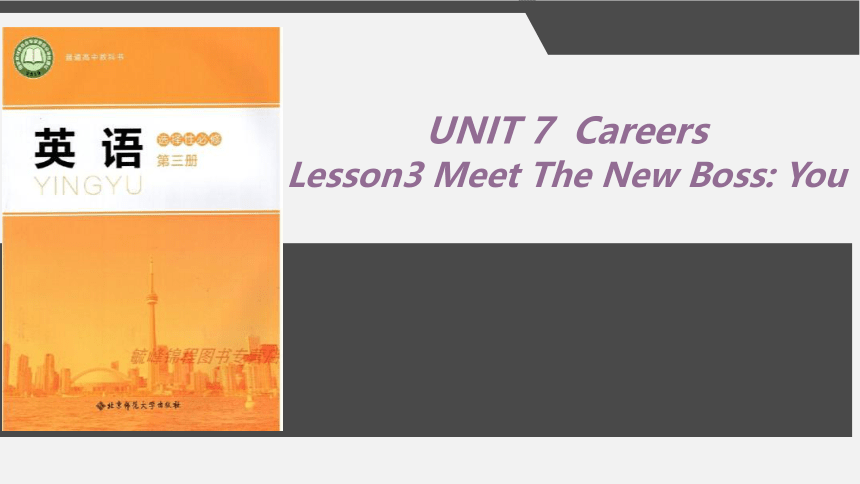
|
|
| 格式 | pptx | ||
| 文件大小 | 6.7MB | ||
| 资源类型 | 教案 | ||
| 版本资源 | 北师大版(2019) | ||
| 科目 | 英语 | ||
| 更新时间 | 2023-09-20 00:00:00 | ||
图片预览

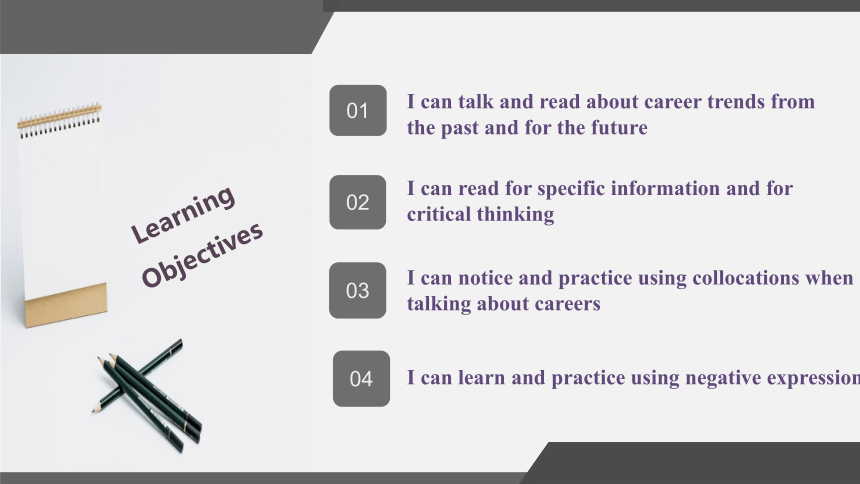
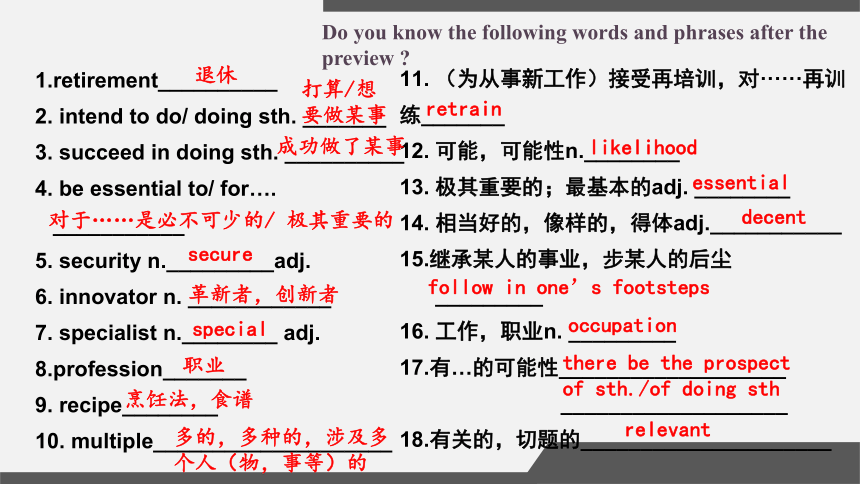
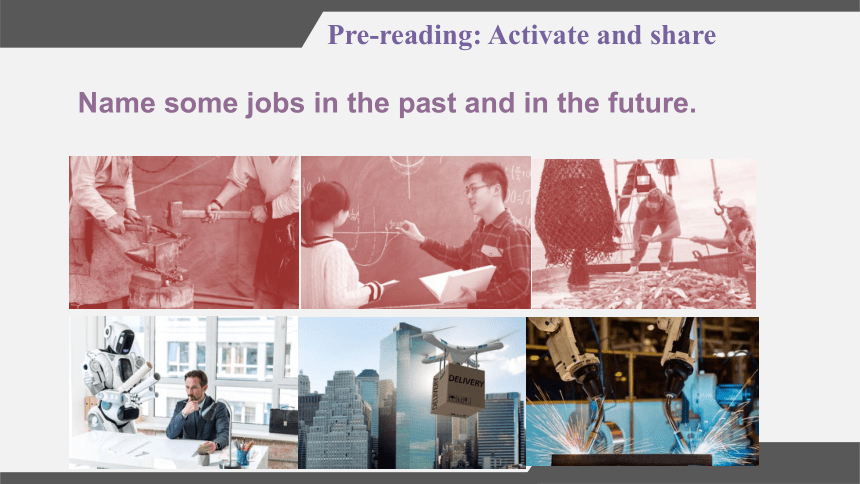
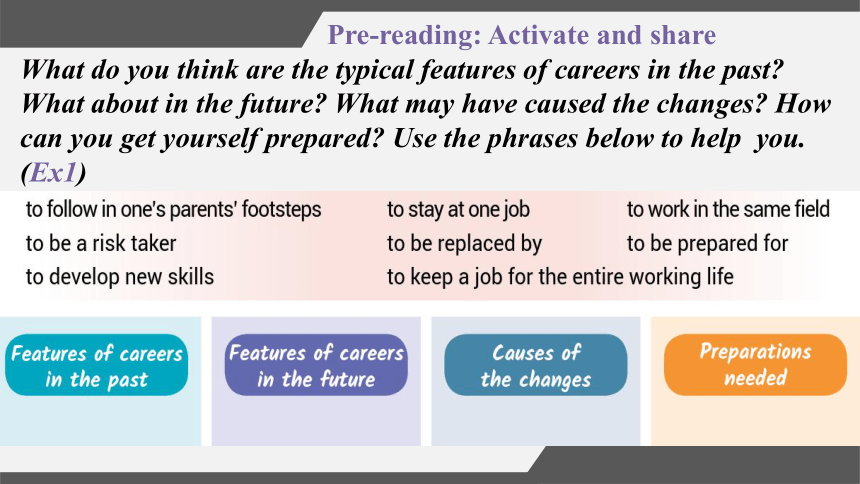
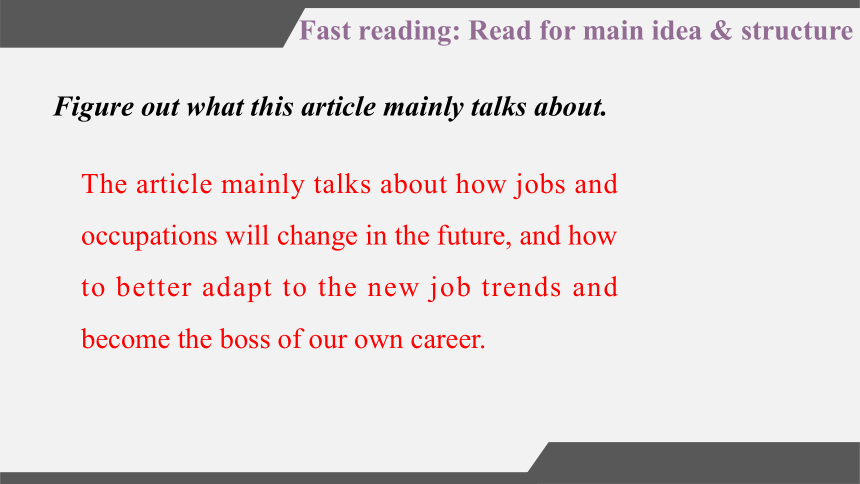
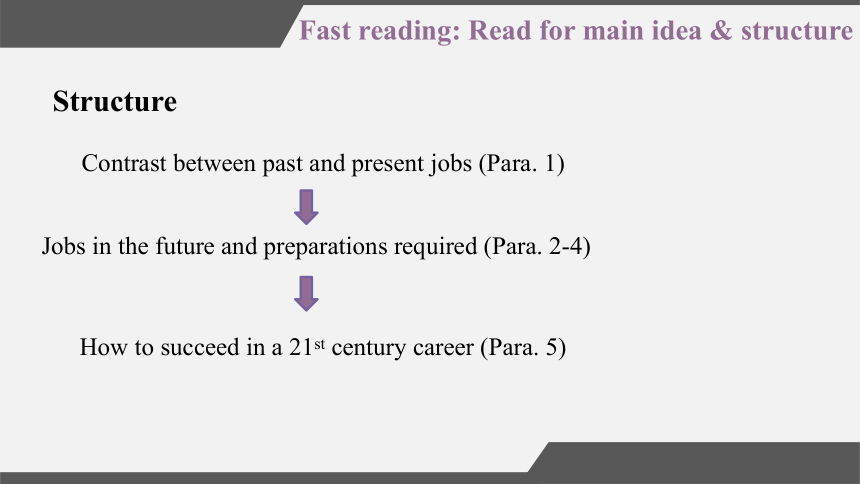
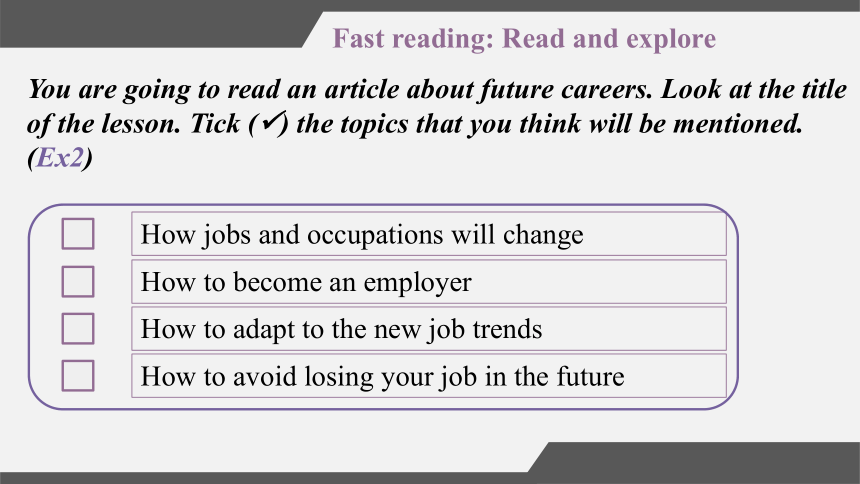
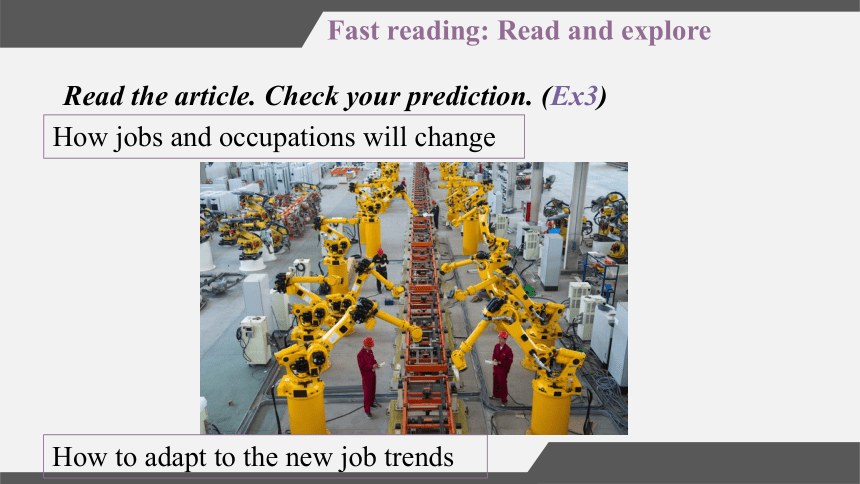
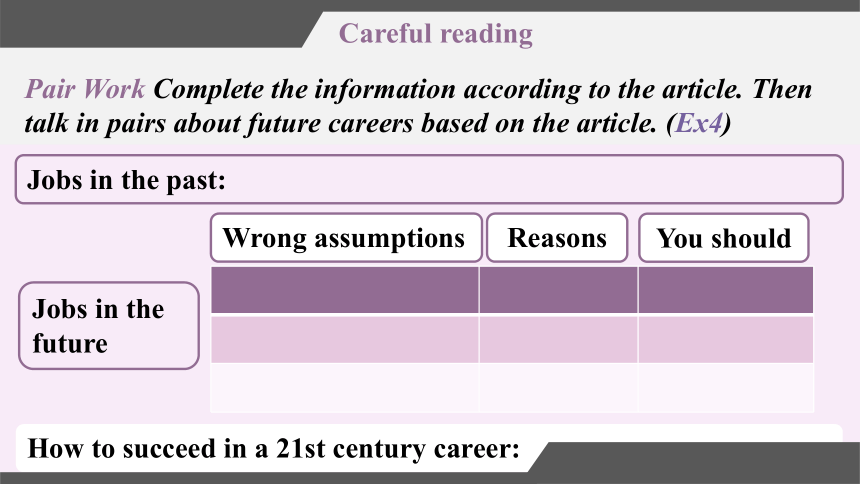
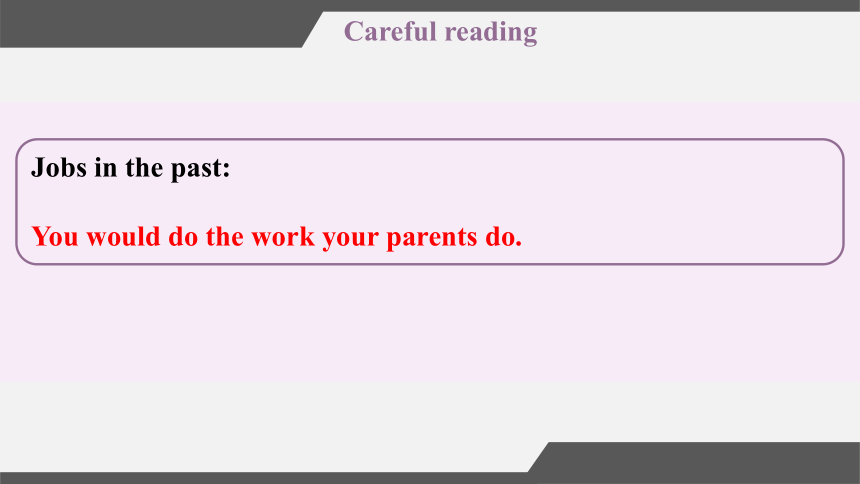
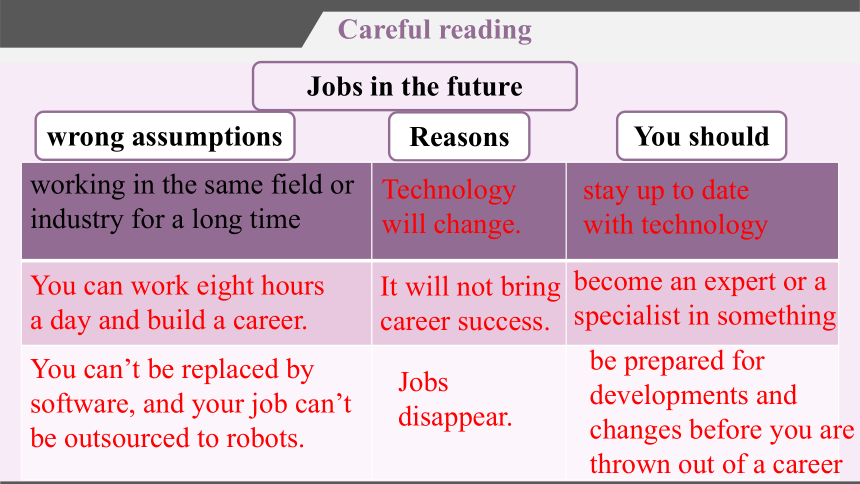
文档简介
(共46张PPT)
UNIT 7 Careers
Lesson3 Meet The New Boss: You
Learning
Objectives
01
02
03
I can talk and read about career trends from the past and for the future
I can read for specific information and for critical thinking
I can notice and practice using collocations when talking about careers
04
I can learn and practice using negative expressions
1.retirement__________
2. intend to do/ doing sth. _______
3. succeed in doing sth. __________
4. be essential to/ for….
___________
5. security n._________adj.
6. innovator n. ____________
7. specialist n.________ adj.
8.profession_______
9. recipe________
10. multiple____________________
退休
11. (为从事新工作)接受再培训,对······再训练_______
12. 可能,可能性n.________
13. 极其重要的;最基本的adj. ________
14. 相当好的,像样的,得体adj.___________
15.继承某人的事业,步某人的后尘
_________
16. 工作,职业n. _________
17.有…的可能性___________________
___________________
18.有关的,切题的_____________________
打算/想要做某事
成功做了某事
secure
革新者,创新者
special
职业
多的,多种的,涉及多个人(物,事等)的
retrain
likelihood
essential
对于……是必不可少的/ 极其重要的
follow in one’s footsteps
occupation
烹饪法,食谱
there be the prospect of sth./of doing sth
decent
relevant
Do you know the following words and phrases after the preview
Pre-reading: Activate and share
Name some jobs in the past and in the future.
Pre-reading: Activate and share
What do you think are the typical features of careers in the past What about in the future What may have caused the changes How can you get yourself prepared Use the phrases below to help you. (Ex1)
Fast reading: Read for main idea & structure
Figure out what this article mainly talks about.
The article mainly talks about how jobs and occupations will change in the future, and how to better adapt to the new job trends and become the boss of our own career.
Structure
Contrast between past and present jobs (Para. 1)
Jobs in the future and preparations required (Para. 2-4)
How to succeed in a 21st century career (Para. 5)
Fast reading: Read for main idea & structure
You are going to read an article about future careers. Look at the title of the lesson. Tick ( ) the topics that you think will be mentioned. (Ex2)
Fast reading: Read and explore
How jobs and occupations will change
How to become an employer
How to adapt to the new job trends
How to avoid losing your job in the future
Read the article. Check your prediction. (Ex3)
Fast reading: Read and explore
How jobs and occupations will change
How to adapt to the new job trends
Pair Work Complete the information according to the article. Then talk in pairs about future careers based on the article. (Ex4)
Jobs in the past:
Wrong assumptions
Reasons
You should
Jobs in the future
How to succeed in a 21st century career:
Careful reading
Jobs in the past:
You would do the work your parents do.
Careful reading
wrong assumptions
Reasons
You should
working in the same field or industry for a long time
Careful reading
You can work eight hours a day and build a career.
You can’t be replaced by software, and your job can’t be outsourced to robots.
Technology will change.
It will not bring career success.
Jobs disappear.
stay up to date with technology
become an expert or a specialist in something
be prepared for developments and changes before you are thrown out of a career
Jobs in the future
Careful reading
How to succeed in a 21st century career:
develop new essential skills
Group Work Think and share. (Ex5)
1. Why does the writer think the “new boss” is “you”
2. On what points do you agree or disagree with the writer Give your reasons.
3. In paragraphs 2-4, the writer discusses some of the wrong assumptions. Why does the writer do this
Careful reading
Group Work Think and share. (Ex5)
1. Why does the writer think the “new boss” is “you”
Careful reading
The author stated clearly at the end: If you want to succeed in the 21st century career, you will have to develop new essential skills. Lifetime security from one employer is no longer certain
or even likely. The truth is that you are the boss of your career, and it is up to you to decide what you can do and how well you
can do it. This means that you are responsible for your future.
Group Work Think and share. (Ex5)
2. On what points do you agree or disagree with the writer Give your reasons.
Careful reading
The answers can be varied.
Group Work Think and share. (Ex5)
3. In paragraphs 2-4, the writer discusses some of the wrong assumptions. Why does the writer do this
Careful reading
The writer uses this way to emphasise what is wrong and invite readers to pay more attention on what he or she says about the real trend about the future. The writer discusses some of the wrong assumptions in order to make the readers reflect and realise that what common people think at present will no longer be true in the future and that they have no other choices but to walk out of their comfort zone and be their boss.
1. Adaptability and flexibility:
the skills that equip you for any challenge
2. Analytical skills:
the ability to make sense of data
3. Commercial awareness:
it is how the industry fits together
4. Communication skills:
the skill that sustains information flow
What should we do to adapt to the career changes
Critical thinking
5. Creativity:
fresh thinking is of great importance
6. Emotional intelligence:
a secret ingredient for career success
7. Influencing skills:
inspiring confidence in others
8. Leadership and management:
prove you are more than an entry-level hire
…
Critical thinking
What should we do to adapt to the career changes
Finish exercise 6 &9 on page 16-17.
Homework
Language points
第二课时
Find verbs in the article to complete the collocations. (Ex6)
1. ______ in one’s parents’ footsteps 2. ______ the same profession
3. ______ the lottery 4. ______ a decent salary
5. ______ a career 6. ______ new essential skills
follow
join
win
earn
build
develop
Complete the sentences with the collocations.
1. John ___________________________ and became a sailor.
2. Mary is determined to ____________ in banking after she graduates from university.
3. You have to _______________________ to stand out in the competitive job market.
4. You must keep learning and work hard, instead of daydreaming to ____________.
5. He _________________ of $200,000 a year.
6. Tom ______________________ as his mother to become a teacher.
followed in his father’s footsteps
build a career
develop new essential skills
win the lottery
earns a decent salary
joined the same profession
Recognising Irony
Writers sometimes use irony (sarcasm, exaggeration and humour). We can infer that he / she is not serious and wants to draw the readers’ attention.
e.g.:
Work hard
Win the lottery
Hope for the best
Skill Builder
Skill Builder
Pair Work Tick ( ) the sentences that show irony. Then discuss your answers. Explain the examples of irony. (Ex7)
You might be lucky. These strategies might bring you a nice, comfortable life …
But most of us today have to look beyond the little box called “career”.
If you think you can work eight hours a day and build a career, think again.
If you think you can’t be replaced by software or your job can’t be outsourced to some robots on the moon, you are wrong.
√
√
√
Focus on Language: Difficult sentences
In your grandparents’ time, there was the prospect of doing the same job from graduation until retirement.
在你祖父母的时代,人们有可能从毕业到退休都做同样的工作。
解析:there be + the prospect of sth / of doing sth 有……可能性
graduation n 毕业 retirement n 退休
Page
14
Focus on Language: Difficult sentences
Most people now have no intention of following in their parents’ footsteps or even staying at one job for very long.
如今大多数人不再想子承父业,甚至不愿长时间做同一份工作。
解析:
have no intention of doing sth 不打算做……;无意做……
Page
15
prospect
1. n. ~ (of sth/of doing sth)~ (that...) the possibility that sth will happen 可能性;希望
There is no immediate prospect of peace. 短期内没有和平的可能。
A place in the semi-finals is in prospect (= likely to happen). 可望争得半决赛权。
There’s a reasonable prospect that his debts will be paid. 有理由相信他会偿还债务的。
2. n. ~ (of sth/of doing sth) an idea of what might or will happen in the future前景;展望;设想
an exciting prospect 令人兴奋的前景
Travelling alone around the world is a daunting prospect.想象着将要只身走遍世界颇令人心悸。
The prospect of becoming a father filled him with alarm. 一想到将为人父他就满怀忧思。
Focus on key words
prospect
3. n. prospects [ pl. ] ~ (for/of sth) the chances of being successful 成功的机会;前景;前途
good job/employment/career prospects 美好的工作/就业/事业前途
At 25 he was an unemployed musician with no prospects.
25岁的他是个没有工作、前途渺茫的乐师。
Long-term prospects for the economy have improved. 长期的经济前景已有所改善。
What are the prospects of promotion in this job 做这份工作有多少晋升的机会?
4. n. ~ (for sth) a person who is likely to be successful in a competition (竞赛中的)有望获胜She is one of Canada’s best prospects for a gold medal.她是加拿大最有希望夺金的选手之一。
5. n. a wide view of an area of land, etc. 风景;景色
a delightful prospect of the lake 令人心旷神怡的湖上风光
Focus on key words
qualify
1. v. ~ (as sth) to reach the standard of ability or knowledge needed to do a particular job, for example by completing a course of study or passing exams 取得资格(或学历);合格
How long does it take to qualify 需要多长时间才能取得资格?
He qualified as a doctor last year. 他去年获得了医生的资格。
2. v. ~ sb (for sth) to give sb the skills and knowledge they need to do sth 使合格;使具备资格
This training course will qualify you for a better job. 本培训课程将使你能胜任更好的工作。
The test qualifies you to drive heavy vehicles. 通过这一考试就有资格驾驶重型车辆。
3. v. ~ (sb) (for sth) to have or give sb the right to do sth 有权,使有权(做某事)
If you live in the area, you qualify for a parking permit.
你若在本地区居住,就有权领取停车许可证。
Focus on key words
You might be able to keep your job if you finish what you are asked to do, but this is hardly a recipe for great career success.
译文:完成别人安排的任务,也许可以保住你的工作,但绝不是取得巨大职业成就的方法。
分析:本句是由连词but连接的两个句子,主句为“ You might be able to keep your job, but this is hardly a recipe for great career success.”if引导条件状语从句,其中what引导宾语从句作finish的宾语。
hardly:used to suggest that sth is unlikely(用于表示做某件事不太可能)
He is hardly likely to admit he was wrong. 他不大可能承认自己错了。
It’s hardly surprising she was fired; she never did any work.
她被解雇了不足为怪,她从来没干过任何工作。
Focus on key long sentences
Focus on Grammar
第三课时
Sentence Builder
Negative Expressions
unlikely to be have no intention of
not … anymore no longer hardly
1. Most people now ________________ following in their parents’ footsteps or even staying in one job for very long.
2. In fact, planning to work in the same field or industry for your entire working life just is ______ practical ________.
Focus on Grammar: Negative expressions
have no intention of
not
anymore
Complete the Sentence Builder with the expressions. (Ex8)
Sentence Builder
Negative Expressions
unlikely to be have no intention of
not … anymore no longer hardly
3. Skills you have now are ___________ enough to help you through your entire career.
4. But this is ______ a recipe for great career success.
5. Lifetime security from one employer is ________ certain or even likely.
Focus on Grammar: Negative expressions
unlikely to be
hardly
no longer
Focus on Grammar: Negative expressions
Complete the sentences with the expressions from the Sentence Builder. (Ex9)
1. High grades are _________ enough to guarantee success in a career.
2. Keeping the same job for life is ____ a realistic expectation ________.
3. The job you have today is ___________ the same as the job you’ll have in 20 years’ time.
no longer
not
anymore
unlikely to be
Focus on Grammar: Negative expressions
4. It’s ______ surprising he lost his job: he was always late and never met his deadlines.
5. The company _______________ hiring more staff because it can use robots to do the work instead.
hardly
has no intention of
Focus on Grammar: Negative expressions
unlikely to do sth 表示“不太可能做某事”
have no intention of doing sth 表示“某人或某组织没有做某事的意愿”
not … anymore 表示“不再”
no longer 表示“不再”
hardly 表示“几乎不”
一、由no和not构成的表示否定意义的词或词组
have no choice/ alternative but to do sth. 除了做某事别无选择
have no intention of doing sth. 没有做某事的打算
not... anymore/ no more 不再
not… any longer/ no longer 不再
not…but... 不是……而是……
in no case/ under no circumstances 决不;无论如何
Focus on Grammar: Negative expressions
一、由no和not构成的表示否定意义的词或词组
The school has no intention of hiring more teachers.
这个学校不打算招聘更多的老师。
Jenny doesn't live there anymore. She's moved to Shanghai.
珍妮不再住在那里了。她搬到了上海。
She made it clear that under no circumstances would she cancel the trip.
她明确表示,无论如何她都不会取消旅行。
Focus on Grammar: Negative expressions
二、由前缀或后缀构成的表示否定意义的词
1. in-, im-, il-, ir-
informal 非正式的;inconvenient 不方便的;indirect 间接的;incorrect 不正确的;impolite 不礼貌的;impossible 不可能的;imperfect 不完美的;impatient 不耐烦的;illegal 不合法的;illogical 不合逻辑的;irregular 不规则的;irresponsible 不负责的
2. un-
unusual 不寻常的;unlikely 不可能的;unfair/unjust 不公平的;unfinished/undone 未完成的;unfortunate/unlucky 不幸的;unwilling 不情愿的
Focus on Grammar: Negative expressions
二、由前缀或后缀构成的表示否定意义的词
3. dis-
disapprove 不同意;disagree 不同意;dishonest 不诚实的;disobey 不服从
4. non-
non-smoker 不吸烟者;non-profit 非营利的;non-violence 非暴力
Focus on Grammar: Negative expressions
三、其他表示否定意义的词或词组
few, little, neither, nor, never, none, hardly, scarcely, too…to...., rather than
We grow neither better nor worse as we grow old but more like ourselves.
随着年龄的增长,我们变得并不是更好也不是更坏,而是变得更像我们自己。
Words can hardly express our gratitude to you.
我们对你的感激难以用语言表达。
Focus on Grammar: Negative expressions
注意:表示否定或半否定意义的词语置于句首时引起的倒装:never, seldom, hardly, scarcely, barely, rarely, little, nowhere, by no means, in no way, at no time, under no condition, not until, not only等置于句首时,句子要用部分倒装。
Little did I know that she had already left.
我几乎不知道她已经离开了。
By no means will I agree to help them.
我决不同意帮助他们。
Focus on Grammar: Negative expressions
Practice
1. Robbie is ____________ (likely) to get the job. He doesn't have the necessary experience.
2. Almost ____________ of us could solve the math problem, for it is too difficult.
3. I must be getting fat—I can ____________ (hard) do my trousers up.
unlikely
none
hardly
Focus on Grammar: Negative expressions
4. The math problem is ____________ difficult to work out.
5. Not the passengers but the driver _________ to blame for the accident.
too
is
Focus on Grammar: Negative expressions
Practice
Homework: Express yourself
Search online and find out what jobs have disappeared in the past 10 years. What new jobs do you think will appear in the next 10 years
UNIT 7 Careers
Lesson3 Meet The New Boss: You
Learning
Objectives
01
02
03
I can talk and read about career trends from the past and for the future
I can read for specific information and for critical thinking
I can notice and practice using collocations when talking about careers
04
I can learn and practice using negative expressions
1.retirement__________
2. intend to do/ doing sth. _______
3. succeed in doing sth. __________
4. be essential to/ for….
___________
5. security n._________adj.
6. innovator n. ____________
7. specialist n.________ adj.
8.profession_______
9. recipe________
10. multiple____________________
退休
11. (为从事新工作)接受再培训,对······再训练_______
12. 可能,可能性n.________
13. 极其重要的;最基本的adj. ________
14. 相当好的,像样的,得体adj.___________
15.继承某人的事业,步某人的后尘
_________
16. 工作,职业n. _________
17.有…的可能性___________________
___________________
18.有关的,切题的_____________________
打算/想要做某事
成功做了某事
secure
革新者,创新者
special
职业
多的,多种的,涉及多个人(物,事等)的
retrain
likelihood
essential
对于……是必不可少的/ 极其重要的
follow in one’s footsteps
occupation
烹饪法,食谱
there be the prospect of sth./of doing sth
decent
relevant
Do you know the following words and phrases after the preview
Pre-reading: Activate and share
Name some jobs in the past and in the future.
Pre-reading: Activate and share
What do you think are the typical features of careers in the past What about in the future What may have caused the changes How can you get yourself prepared Use the phrases below to help you. (Ex1)
Fast reading: Read for main idea & structure
Figure out what this article mainly talks about.
The article mainly talks about how jobs and occupations will change in the future, and how to better adapt to the new job trends and become the boss of our own career.
Structure
Contrast between past and present jobs (Para. 1)
Jobs in the future and preparations required (Para. 2-4)
How to succeed in a 21st century career (Para. 5)
Fast reading: Read for main idea & structure
You are going to read an article about future careers. Look at the title of the lesson. Tick ( ) the topics that you think will be mentioned. (Ex2)
Fast reading: Read and explore
How jobs and occupations will change
How to become an employer
How to adapt to the new job trends
How to avoid losing your job in the future
Read the article. Check your prediction. (Ex3)
Fast reading: Read and explore
How jobs and occupations will change
How to adapt to the new job trends
Pair Work Complete the information according to the article. Then talk in pairs about future careers based on the article. (Ex4)
Jobs in the past:
Wrong assumptions
Reasons
You should
Jobs in the future
How to succeed in a 21st century career:
Careful reading
Jobs in the past:
You would do the work your parents do.
Careful reading
wrong assumptions
Reasons
You should
working in the same field or industry for a long time
Careful reading
You can work eight hours a day and build a career.
You can’t be replaced by software, and your job can’t be outsourced to robots.
Technology will change.
It will not bring career success.
Jobs disappear.
stay up to date with technology
become an expert or a specialist in something
be prepared for developments and changes before you are thrown out of a career
Jobs in the future
Careful reading
How to succeed in a 21st century career:
develop new essential skills
Group Work Think and share. (Ex5)
1. Why does the writer think the “new boss” is “you”
2. On what points do you agree or disagree with the writer Give your reasons.
3. In paragraphs 2-4, the writer discusses some of the wrong assumptions. Why does the writer do this
Careful reading
Group Work Think and share. (Ex5)
1. Why does the writer think the “new boss” is “you”
Careful reading
The author stated clearly at the end: If you want to succeed in the 21st century career, you will have to develop new essential skills. Lifetime security from one employer is no longer certain
or even likely. The truth is that you are the boss of your career, and it is up to you to decide what you can do and how well you
can do it. This means that you are responsible for your future.
Group Work Think and share. (Ex5)
2. On what points do you agree or disagree with the writer Give your reasons.
Careful reading
The answers can be varied.
Group Work Think and share. (Ex5)
3. In paragraphs 2-4, the writer discusses some of the wrong assumptions. Why does the writer do this
Careful reading
The writer uses this way to emphasise what is wrong and invite readers to pay more attention on what he or she says about the real trend about the future. The writer discusses some of the wrong assumptions in order to make the readers reflect and realise that what common people think at present will no longer be true in the future and that they have no other choices but to walk out of their comfort zone and be their boss.
1. Adaptability and flexibility:
the skills that equip you for any challenge
2. Analytical skills:
the ability to make sense of data
3. Commercial awareness:
it is how the industry fits together
4. Communication skills:
the skill that sustains information flow
What should we do to adapt to the career changes
Critical thinking
5. Creativity:
fresh thinking is of great importance
6. Emotional intelligence:
a secret ingredient for career success
7. Influencing skills:
inspiring confidence in others
8. Leadership and management:
prove you are more than an entry-level hire
…
Critical thinking
What should we do to adapt to the career changes
Finish exercise 6 &9 on page 16-17.
Homework
Language points
第二课时
Find verbs in the article to complete the collocations. (Ex6)
1. ______ in one’s parents’ footsteps 2. ______ the same profession
3. ______ the lottery 4. ______ a decent salary
5. ______ a career 6. ______ new essential skills
follow
join
win
earn
build
develop
Complete the sentences with the collocations.
1. John ___________________________ and became a sailor.
2. Mary is determined to ____________ in banking after she graduates from university.
3. You have to _______________________ to stand out in the competitive job market.
4. You must keep learning and work hard, instead of daydreaming to ____________.
5. He _________________ of $200,000 a year.
6. Tom ______________________ as his mother to become a teacher.
followed in his father’s footsteps
build a career
develop new essential skills
win the lottery
earns a decent salary
joined the same profession
Recognising Irony
Writers sometimes use irony (sarcasm, exaggeration and humour). We can infer that he / she is not serious and wants to draw the readers’ attention.
e.g.:
Work hard
Win the lottery
Hope for the best
Skill Builder
Skill Builder
Pair Work Tick ( ) the sentences that show irony. Then discuss your answers. Explain the examples of irony. (Ex7)
You might be lucky. These strategies might bring you a nice, comfortable life …
But most of us today have to look beyond the little box called “career”.
If you think you can work eight hours a day and build a career, think again.
If you think you can’t be replaced by software or your job can’t be outsourced to some robots on the moon, you are wrong.
√
√
√
Focus on Language: Difficult sentences
In your grandparents’ time, there was the prospect of doing the same job from graduation until retirement.
在你祖父母的时代,人们有可能从毕业到退休都做同样的工作。
解析:there be + the prospect of sth / of doing sth 有……可能性
graduation n 毕业 retirement n 退休
Page
14
Focus on Language: Difficult sentences
Most people now have no intention of following in their parents’ footsteps or even staying at one job for very long.
如今大多数人不再想子承父业,甚至不愿长时间做同一份工作。
解析:
have no intention of doing sth 不打算做……;无意做……
Page
15
prospect
1. n. ~ (of sth/of doing sth)~ (that...) the possibility that sth will happen 可能性;希望
There is no immediate prospect of peace. 短期内没有和平的可能。
A place in the semi-finals is in prospect (= likely to happen). 可望争得半决赛权。
There’s a reasonable prospect that his debts will be paid. 有理由相信他会偿还债务的。
2. n. ~ (of sth/of doing sth) an idea of what might or will happen in the future前景;展望;设想
an exciting prospect 令人兴奋的前景
Travelling alone around the world is a daunting prospect.想象着将要只身走遍世界颇令人心悸。
The prospect of becoming a father filled him with alarm. 一想到将为人父他就满怀忧思。
Focus on key words
prospect
3. n. prospects [ pl. ] ~ (for/of sth) the chances of being successful 成功的机会;前景;前途
good job/employment/career prospects 美好的工作/就业/事业前途
At 25 he was an unemployed musician with no prospects.
25岁的他是个没有工作、前途渺茫的乐师。
Long-term prospects for the economy have improved. 长期的经济前景已有所改善。
What are the prospects of promotion in this job 做这份工作有多少晋升的机会?
4. n. ~ (for sth) a person who is likely to be successful in a competition (竞赛中的)有望获胜She is one of Canada’s best prospects for a gold medal.她是加拿大最有希望夺金的选手之一。
5. n. a wide view of an area of land, etc. 风景;景色
a delightful prospect of the lake 令人心旷神怡的湖上风光
Focus on key words
qualify
1. v. ~ (as sth) to reach the standard of ability or knowledge needed to do a particular job, for example by completing a course of study or passing exams 取得资格(或学历);合格
How long does it take to qualify 需要多长时间才能取得资格?
He qualified as a doctor last year. 他去年获得了医生的资格。
2. v. ~ sb (for sth) to give sb the skills and knowledge they need to do sth 使合格;使具备资格
This training course will qualify you for a better job. 本培训课程将使你能胜任更好的工作。
The test qualifies you to drive heavy vehicles. 通过这一考试就有资格驾驶重型车辆。
3. v. ~ (sb) (for sth) to have or give sb the right to do sth 有权,使有权(做某事)
If you live in the area, you qualify for a parking permit.
你若在本地区居住,就有权领取停车许可证。
Focus on key words
You might be able to keep your job if you finish what you are asked to do, but this is hardly a recipe for great career success.
译文:完成别人安排的任务,也许可以保住你的工作,但绝不是取得巨大职业成就的方法。
分析:本句是由连词but连接的两个句子,主句为“ You might be able to keep your job, but this is hardly a recipe for great career success.”if引导条件状语从句,其中what引导宾语从句作finish的宾语。
hardly:used to suggest that sth is unlikely(用于表示做某件事不太可能)
He is hardly likely to admit he was wrong. 他不大可能承认自己错了。
It’s hardly surprising she was fired; she never did any work.
她被解雇了不足为怪,她从来没干过任何工作。
Focus on key long sentences
Focus on Grammar
第三课时
Sentence Builder
Negative Expressions
unlikely to be have no intention of
not … anymore no longer hardly
1. Most people now ________________ following in their parents’ footsteps or even staying in one job for very long.
2. In fact, planning to work in the same field or industry for your entire working life just is ______ practical ________.
Focus on Grammar: Negative expressions
have no intention of
not
anymore
Complete the Sentence Builder with the expressions. (Ex8)
Sentence Builder
Negative Expressions
unlikely to be have no intention of
not … anymore no longer hardly
3. Skills you have now are ___________ enough to help you through your entire career.
4. But this is ______ a recipe for great career success.
5. Lifetime security from one employer is ________ certain or even likely.
Focus on Grammar: Negative expressions
unlikely to be
hardly
no longer
Focus on Grammar: Negative expressions
Complete the sentences with the expressions from the Sentence Builder. (Ex9)
1. High grades are _________ enough to guarantee success in a career.
2. Keeping the same job for life is ____ a realistic expectation ________.
3. The job you have today is ___________ the same as the job you’ll have in 20 years’ time.
no longer
not
anymore
unlikely to be
Focus on Grammar: Negative expressions
4. It’s ______ surprising he lost his job: he was always late and never met his deadlines.
5. The company _______________ hiring more staff because it can use robots to do the work instead.
hardly
has no intention of
Focus on Grammar: Negative expressions
unlikely to do sth 表示“不太可能做某事”
have no intention of doing sth 表示“某人或某组织没有做某事的意愿”
not … anymore 表示“不再”
no longer 表示“不再”
hardly 表示“几乎不”
一、由no和not构成的表示否定意义的词或词组
have no choice/ alternative but to do sth. 除了做某事别无选择
have no intention of doing sth. 没有做某事的打算
not... anymore/ no more 不再
not… any longer/ no longer 不再
not…but... 不是……而是……
in no case/ under no circumstances 决不;无论如何
Focus on Grammar: Negative expressions
一、由no和not构成的表示否定意义的词或词组
The school has no intention of hiring more teachers.
这个学校不打算招聘更多的老师。
Jenny doesn't live there anymore. She's moved to Shanghai.
珍妮不再住在那里了。她搬到了上海。
She made it clear that under no circumstances would she cancel the trip.
她明确表示,无论如何她都不会取消旅行。
Focus on Grammar: Negative expressions
二、由前缀或后缀构成的表示否定意义的词
1. in-, im-, il-, ir-
informal 非正式的;inconvenient 不方便的;indirect 间接的;incorrect 不正确的;impolite 不礼貌的;impossible 不可能的;imperfect 不完美的;impatient 不耐烦的;illegal 不合法的;illogical 不合逻辑的;irregular 不规则的;irresponsible 不负责的
2. un-
unusual 不寻常的;unlikely 不可能的;unfair/unjust 不公平的;unfinished/undone 未完成的;unfortunate/unlucky 不幸的;unwilling 不情愿的
Focus on Grammar: Negative expressions
二、由前缀或后缀构成的表示否定意义的词
3. dis-
disapprove 不同意;disagree 不同意;dishonest 不诚实的;disobey 不服从
4. non-
non-smoker 不吸烟者;non-profit 非营利的;non-violence 非暴力
Focus on Grammar: Negative expressions
三、其他表示否定意义的词或词组
few, little, neither, nor, never, none, hardly, scarcely, too…to...., rather than
We grow neither better nor worse as we grow old but more like ourselves.
随着年龄的增长,我们变得并不是更好也不是更坏,而是变得更像我们自己。
Words can hardly express our gratitude to you.
我们对你的感激难以用语言表达。
Focus on Grammar: Negative expressions
注意:表示否定或半否定意义的词语置于句首时引起的倒装:never, seldom, hardly, scarcely, barely, rarely, little, nowhere, by no means, in no way, at no time, under no condition, not until, not only等置于句首时,句子要用部分倒装。
Little did I know that she had already left.
我几乎不知道她已经离开了。
By no means will I agree to help them.
我决不同意帮助他们。
Focus on Grammar: Negative expressions
Practice
1. Robbie is ____________ (likely) to get the job. He doesn't have the necessary experience.
2. Almost ____________ of us could solve the math problem, for it is too difficult.
3. I must be getting fat—I can ____________ (hard) do my trousers up.
unlikely
none
hardly
Focus on Grammar: Negative expressions
4. The math problem is ____________ difficult to work out.
5. Not the passengers but the driver _________ to blame for the accident.
too
is
Focus on Grammar: Negative expressions
Practice
Homework: Express yourself
Search online and find out what jobs have disappeared in the past 10 years. What new jobs do you think will appear in the next 10 years
